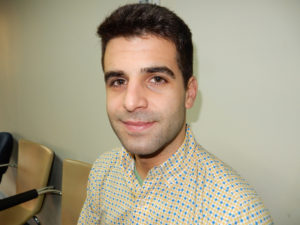Family violence initiative for CALD communities
A ground-breaking course for leaders from CALD communities in the Prevention of Violence Against Women (PVAW) was recently launched in Melbourne.
The course, facilitated by migrant and refugee settlement agency AMES Australia, has brought together 42 leaders from different language groups and communities to explore ways of combating family violence.
Supported by VicHealth and the Department of Social Services, the course follows the publication of a report last year that identified a need for strategies to combat family violence in some communities.
The report found women from culturally and linguistically diverse (CALD) backgrounds are among the most vulnerable victims of family violence.

Pedro Matos
The course is facilitated by AMES Australia Senior Manager Prevention of Violence Against Women – Respect and Responsibility Program Wendy Lobwein.
Wendy said the aim was to teach some innovative strategies but also harvesting ideas from the students themselves.
“One in three Australian women has experienced violence at the hands of a partner – that amounts to around 2.5 million victims,” Wendy said.
“We know that at least one woman a week is killed by a partner or former partner in this country, we know that family violence is the main cause of homelessness among women and children and we know that women from culturally and linguistically diverse backgrounds can be vulnerable to family violence too,” she said.
“The course aims to build the capacity of leaders from CALD communities to be able to lead actions to reduce violence against women in their own communities and also in the broader Australian community,” Wendy said.
AMES Australia CEO Cath Scarth said the course was meeting a clear need.
“Our aim is to see everyone who is new to Australia take a full part in the social and economic life of the nation – and for that to happen women need to be able to participate,” Ms Scarth said.
“We all know that family violence is a scourge in Australia. It’s a scourge in all groups and across all stratum in our society,” she said.
“We know that one in three Australian women has experienced violence at the hands of a partner – that amounts to around 2.5 million victims.
“At least one woman a week is killed by a partner or former partner in this country and family violence is the main cause of homelessness among women and children.
“And we know that women from culturally and linguistically diverse backgrounds can be vulnerable to family violence too. So, the question is, what do we do about it?” Ms Scarth said.
She said the course aimed to build the capacity of leaders from CALD communities to be able to lead actions to reduce violence against women in their own communities and also in the broader Australian community.
“We are proud to be delivering this first course and we hope it is the forerunner of many more into the future,” Ms Scarth said.
The research report, titled ‘Violence against women in CALD communities’, found that women from culturally and linguistically diverse (CALD) backgrounds can be among the most vulnerable victims of family violence and the issue can lead to the stigmatising of some groups.
It concluded that addressing violence against women was a critical task of settlement policy and practice in Australia.
The report found social exclusion and racism are factors which increase the risk of violence in some diverse communities – because groups isolated from mainstream society find it more difficult to integrate and understand social norms and laws related to family violence.
It said certain groups of women were particularly vulnerable to being victimised and that there are attitudes and levels of awareness in some communities towards the issue of family violence that can be at odds with broader societal attitudes.
To date, the effort to prevent family violence nationally has focused largely on the community as a whole, with not much attention paid to addressing factors relevant to particular communities, the report said.
It said the risk of this approach – when it does not include strategies tailored to the needs and contexts of particular groups – is that the gains made in prevention may not be shared equally.
One of the community leaders taking the course is Naureen Choudry, from the Ahamadiyya Muslim Community in Melbourne’s south east.
She also works as an electorate officer for local Labor MP Judith Grayley.
“The City of Casey has had the second highest incidence of family violence for the past five years – so we need to do something,” Naureen said.
“It is a multi-faceted problem which exists across cultures and across socio-economic strata,” she said.
“There is no easy or simple solution but this course will highlight some of the issues. We can then work with different emerging communities and through our networks and social media to get out messages that family violence is not acceptable and that there is support available,” Naureen said.
Portuguese community leader Pedro Matos said there were high rates of family violence among the Portuguese and Brazilian communities and also among Portuguese-speaking African communities.
“The course is helping us understand the issues around violence and it will inform us in developing strategies to combat it,” Pedro said.
“I want to take on the role as a leader in my community and facilitate others to become leaders also,” said Pedro, who acts as an interpreter and translator for members of his community.
Laurie Nowell
AMES Australia Senior Journalist












